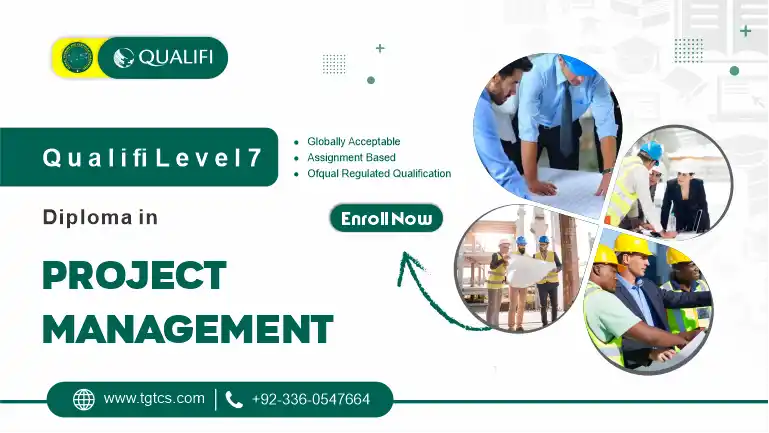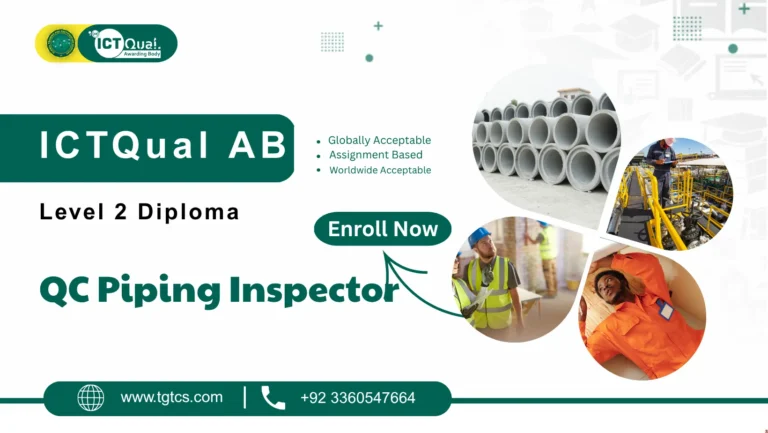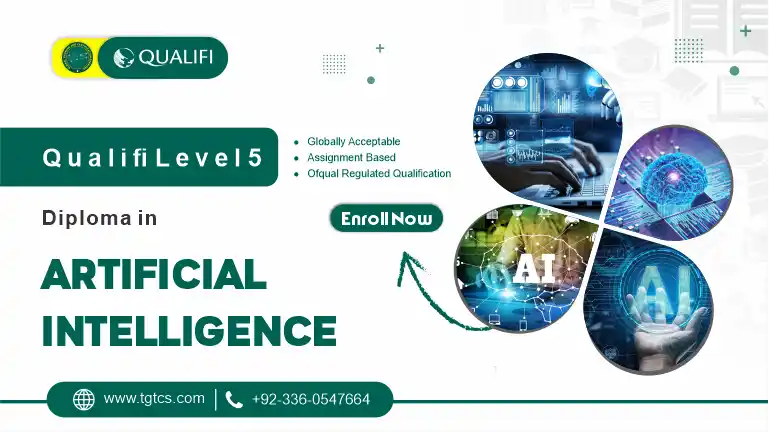ICTQual Level 4 Diploma in Mechanical Engineering 120 Credits – One Year
The ICTQual Level 4 Diploma in Mechanical Engineering offers an incredible opportunity for learners to develop essential skills and knowledge required for a successful career in the mechanical engineering field. This one-year, 120-credit course is designed to equip students with the expertise needed to work in industries like manufacturing, automotive, energy, and more.
The ICTQual Level 4 Diploma in Mechanical Engineering is a comprehensive qualification that provides students with the foundational knowledge, practical experience, and critical thinking skills required to succeed as mechanical engineers. Covering essential topics in mechanical engineering, including materials science, thermodynamics, mechanical design, and project management, this diploma is ideal for individuals looking to pursue a career in this dynamic field.
Mechanical engineering is one of the most diverse and in-demand engineering fields. Mechanical engineers work across a variety of industries, from aerospace to energy to robotics. As technological advancements continue, the demand for skilled engineers remains high. Pursuing a Diploma in Mechanical Engineering is a step toward securing a rewarding and dynamic career in a field with endless growth opportunities.
The ICTQual Level 4 Diploma in Mechanical Engineering is a great starting point for anyone looking to build a successful career in mechanical engineering. The course offers a strong foundation in engineering principles, hands-on experience, and a pathway to advanced education and exciting job opportunities.
The Global Training and Certification Services (TGTCS) is Directly Approved Training Centre of ICTQual
The ICTQual Level 4 Diploma in Mechanical Engineering is a comprehensive one-year program designed to provide students with a solid foundation in mechanical engineering principles. This 120-credit qualification covers essential topics such as materials science, thermodynamics, mechanical design, and project management. The course combines theoretical knowledge with practical skills, equipping students with the expertise to design, analyze, and manage mechanical systems.
Upon completion, graduates will have the skills required for various roles in the mechanical engineering field, such as mechanical engineer, product development engineer, and manufacturing engineer. Additionally, the diploma offers pathways to further education, including advanced diplomas or bachelor’s degrees in mechanical engineering, as well as professional certifications. This program is ideal for aspiring engineers, career changers, or professionals seeking to enhance their technical expertise and career prospects.
Mandatory Units
The Units of Level 4 Diploma in Mechanical Engineering 120 Credits – One Year are as ;
- Engineering Mathematics
- Mechanical Design Principles
- Thermodynamics
- Fluid Mechanics
- Materials Science
- Manufacturing Processes
- Engineering Mechanics
- Mechanical Systems and Control
- Strength of Materials
- Project Management in Engineering
- Computational Fluid Dynamics (CFD) and Simulation
- Sustainability and Environmental Engineering
Here are the learning outcomes for each study unit in the ICTQual Level 4 Diploma in Mechanical Engineering program:
- Engineering Mathematics
- Apply key mathematical concepts, including algebra, calculus, trigonometry, and statistics, to solve engineering problems.
- Develop proficiency in using mathematical methods to analyze mechanical systems such as forces, motion, and material behavior.
- Use mathematical techniques in the design and evaluation of mechanical engineering solutions.
- Mechanical Design Principles
- Understand the mechanical design process, including material selection, stress analysis, and component design.
- Utilize Computer-Aided Design (CAD) software to create and modify engineering drawings and models.
- Apply engineering design principles to solve complex mechanical engineering challenges.
- Thermodynamics
- Grasp core thermodynamic concepts, including the laws of thermodynamics, energy transfer, and heat engines.
- Solve thermodynamic problems related to mechanical systems, such as boilers, heat exchangers, and engines.
- Optimize mechanical system efficiency using thermodynamic principles.
- Fluid Mechanics
- Gain a solid understanding of fluid properties, including pressure, flow rate, and fluid dynamics.
- Apply fluid mechanics principles to design and analyze systems like pumps, turbines, and piping.
- Solve real-world fluid flow problems in mechanical engineering contexts.
- Materials Science
- Understand the behavior and properties of materials used in mechanical engineering, such as metals, polymers, ceramics, and composites.
- Assess how material selection impacts the performance and durability of mechanical components.
- Apply materials science principles to select optimal materials for specific engineering applications.
- Manufacturing Processes
- Explore various manufacturing methods, such as casting, welding, machining, and additive manufacturing.
- Choose the most suitable manufacturing techniques based on material properties, design requirements, and cost considerations.
- Apply manufacturing knowledge to design practical and efficient mechanical systems.
- Engineering Mechanics
- Analyze forces and moments in mechanical structures using statics and dynamics principles.
- Solve problems involving motion, acceleration, velocity, and force distribution.
- Apply mechanics principles to understand and predict the behavior of mechanical components under various loads.
- Mechanical Systems and Control
- Understand the operation and design of mechanical systems, including drives, linkages, and automation.
- Utilize control theory and techniques to regulate mechanical processes and improve system performance.
- Design and evaluate mechanical systems that incorporate integrated control mechanisms.
- Strength of Materials
- Understand how materials behave under stress, including tension, compression, bending, and shear.
- Analyze material deformation and failure to assess the strength and stability of mechanical components.
- Apply material strength principles to the design and testing of mechanical structures.
- Project Management in Engineering
- Develop project management skills, such as planning, scheduling, and budgeting for engineering projects.
- Use tools and techniques to manage engineering projects, ensuring they are completed on time, within budget, and to required quality standards.
- Demonstrate an understanding of risk management, safety, and sustainability in engineering projects.
- Computational Fluid Dynamics (CFD) and Simulation
- Understand the fundamentals and applications of Computational Fluid Dynamics (CFD) in mechanical engineering.
- Use CFD software tools to simulate fluid flow and heat transfer within mechanical systems.
- Analyze CFD results to solve engineering problems related to fluid dynamics and optimize system performance.
- Sustainability and Environmental Engineering
- Understand the principles of sustainability in mechanical engineering, focusing on reducing environmental impacts in design and manufacturing.
- Assess how mechanical engineering can help address environmental issues like energy efficiency and waste reduction.
- Integrate sustainable practices into mechanical designs to minimize environmental impact.
he ICTQual Level 4 Diploma in Mechanical Engineering offers numerous benefits that equip students with both theoretical knowledge and practical skills essential for success in the mechanical engineering field. Here are some of the key advantages of completing this course:
- Comprehensive Knowledge in Core Engineering Disciplines
- This course provides a well-rounded foundation in mechanical engineering, covering essential topics such as thermodynamics, fluid mechanics, materials science, and mechanical design. By mastering these core concepts, graduates are equipped to address a wide range of engineering challenges in various industries.
- Practical Skills for Real-World Application
- Students gain hands-on experience with engineering software such as CAD, and also learn how to apply engineering principles to real-world problems. This combination of theory and practice ensures graduates are ready to work in a professional setting from day one.
- Improved Career Prospects
- Completing the Level 4 Diploma opens up a wide range of career opportunities in industries such as automotive, aerospace, energy, manufacturing, and construction. Graduates can pursue roles such as mechanical engineer, design engineer, project manager, and more.
- In-Depth Understanding of Sustainable Engineering Practices
- The course incorporates key concepts of sustainability and environmental engineering, helping students understand the importance of designing energy-efficient, environmentally friendly mechanical systems. Graduates are well-prepared to address the global demand for sustainable engineering solutions.
- Enhanced Problem-Solving Abilities
- The curriculum challenges students to solve complex engineering problems, develop critical thinking, and apply innovative solutions. This enhances their ability to approach engineering challenges with creativity and technical precision.
- Pathway for Further Education and Professional Development
- Graduates can progress to higher-level qualifications, such as a Level 5 Diploma or a Bachelor’s degree in mechanical engineering. Additionally, they can pursue professional certifications and memberships with engineering organizations, which can further boost career prospects and recognition in the industry.
- Industry-Relevant Skills and Knowledge
- The course is designed in consultation with industry professionals to ensure that the skills learned are directly applicable to modern mechanical engineering practices. Graduates are equipped with the tools, techniques, and industry insight needed to excel in today’s rapidly evolving engineering landscape.
- Opportunities for Entrepreneurship
- With a solid foundation in mechanical engineering principles, graduates can also consider starting their own engineering consultancy or manufacturing business, offering specialized services in design, systems optimization, and sustainability.
- Hands-On Learning with Advanced Technologies
- Students gain experience with cutting-edge technologies such as Computational Fluid Dynamics (CFD) and simulation software, preparing them to work with the latest tools used in mechanical engineering industries.
- Global Career Opportunities
- Mechanical engineering is a globally recognized profession with opportunities available worldwide. Graduates of the ICTQual Level 4 Diploma can find employment across a variety of regions and industries, making this qualification an internationally recognized stepping stone for a successful career.
Overall, the ICTQual Level 4 Diploma in Mechanical Engineering provides an excellent starting point for individuals who are serious about pursuing a successful and fulfilling career in mechanical engineering.
The ICTQual Level 4 Diploma in Mechanical Engineering is designed for individuals who have a passion for engineering and want to develop the technical knowledge and skills necessary to succeed in the mechanical engineering industry. The ideal learner for this course possesses the following characteristics:
- Interest in Engineering and Problem-Solving
- The ideal learner has a strong interest in mechanical systems and enjoys solving complex problems. They are driven by curiosity and eager to understand how things work, particularly in the context of designing and optimizing mechanical systems.
- Background in Science or Mathematics
- While prior experience in mechanical engineering is not required, the course is well-suited for individuals who have a background in science, technology, engineering, or mathematics (STEM). Students with an understanding of basic mathematics, physics, and engineering principles will find the content more accessible and engaging.
- Aspiring Mechanical Engineers
- This course is perfect for individuals who aim to pursue a career as a mechanical engineer, design engineer, or in other related roles. The ideal learner is motivated by the prospect of designing and creating systems, machinery, and equipment in various industries, including automotive, aerospace, manufacturing, and energy.
- Attention to Detail and Analytical Mindset
- The ideal learner enjoys working with precision and has a keen eye for detail. Mechanical engineering often involves analyzing complex data, evaluating materials, and designing efficient systems, so an analytical mindset is essential for success in this course.
- Hands-On Learner with Practical Interests
- This course emphasizes practical, real-world applications of engineering principles. The ideal learner enjoys working with tools, software, and equipment to test and implement designs. They have a strong desire to apply theoretical knowledge to hands-on projects and real engineering problems.
- Career-Focused and Motivated
- The ideal learner is career-driven and motivated to gain the qualifications needed to enter or advance in the mechanical engineering field. They are eager to learn industry-relevant skills and gain qualifications that will open doors to employment opportunities in engineering roles.
- Adaptable and Willing to Learn New Technologies
- Given the fast-paced nature of technology and engineering fields, the ideal learner should be open to learning new technologies and software tools, including CAD systems, simulation tools, and advanced techniques like Computational Fluid Dynamics (CFD). They should be excited to work with emerging technologies that are shaping the future of mechanical engineering.
- Committed to Sustainability and Environmental Responsibility
- Students interested in environmental engineering and sustainability will also benefit from this course. The program covers principles of sustainability in mechanical design and manufacturing processes, so an ideal learner may have an interest in creating energy-efficient, eco-friendly solutions for modern engineering challenges.
- Self-Motivated and Disciplined
- The ICTQual Level 4 Diploma is a one-year program that requires dedication and time management skills. The ideal learner is self-disciplined, motivated to meet deadlines, and capable of managing a full-time study load while balancing other commitments.
- Future-Oriented and Ambitious
- This course is perfect for individuals who are looking to advance their careers, whether by progressing to higher qualifications or gaining industry certifications. The ideal learner is forward-thinking and has long-term goals of becoming a leader in the mechanical engineering field, whether in design, project management, or technical innovation.
In summary, the ideal learner for the ICTQual Level 4 Diploma in Mechanical Engineering is someone with a keen interest in engineering, strong analytical skills, and a commitment to applying their knowledge to real-world mechanical systems. They should be motivated, hands-on, and eager to pursue a career in one of the many diverse sectors that require mechanical engineering expertise.
The ICTQual Level 4 Diploma in Mechanical Engineering opens up a wide array of progression opportunities for students upon successful completion. This qualification lays a solid foundation for both career advancement and further academic exploration in mechanical engineering. Below are the key pathways for further growth:
1. Professional Certification and Accreditation
- Chartered Engineer (CEng): With additional experience and qualifications, graduates may work towards becoming a Chartered Engineer, a prestigious professional status recognized by bodies such as the Institution of Mechanical Engineers (IMechE). Achieving this accreditation unlocks higher-level roles and leadership positions within the engineering sector.
- Other Professional Certifications: Graduates can pursue additional industry-recognized certifications from institutions like the Institution of Engineering and Technology (IET), enhancing their professional profile and career prospects.
2. Employment Opportunities in Mechanical Engineering
- Mechanical Design Engineer: Graduates can start their careers in mechanical design, developing and testing mechanical systems and components for various industries, including automotive, aerospace, and manufacturing.
- Project Engineer: In this role, graduates manage engineering projects, ensuring timely completion while adhering to budgets and safety standards.
- Manufacturing Engineer: Mechanical engineers in manufacturing optimize production processes, ensuring efficiency and quality in the production of mechanical components.
- Maintenance Engineer: This role focuses on ensuring the smooth operation of machinery and mechanical systems, minimizing downtime, and maximizing performance in industries such as automotive, manufacturing, and energy.
- Systems Engineer: Graduates can work as systems engineers, designing, integrating, and managing complex systems in fields like robotics, energy, and automation.
3. Advanced Studies and Specialization
- Master’s Degree (MSc) in Mechanical Engineering or Related Fields: Graduates can pursue a Master’s degree to specialize in areas like robotics, advanced materials, or renewable energy systems. This can lead to higher-level research, development, and academic positions.
- Postgraduate Certificates/Diplomas: For further specialization, graduates may pursue postgraduate qualifications in engineering management, industrial automation, or advanced mechanical systems.
4. Entrepreneurship and Innovation
- Graduates with an entrepreneurial spirit may choose to start their own engineering consultancy or mechanical design company. The skills gained during the diploma—such as project management, manufacturing processes, and design principles—are invaluable for those looking to innovate and create new products or technologies.
The ICTQual Level 4 Diploma in Mechanical Engineering provides a strong foundation for a successful career, further academic pursuits, and professional certifications, equipping graduates to explore diverse opportunities in the dynamic field of mechanical engineering.
Course Overview
Course Level
Level 4
Course Units
12 Mandatory Units
Duration
one year






